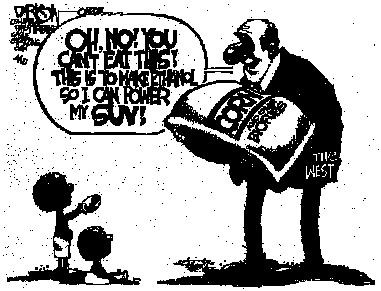Century Marks

Untapped gift: A quiet, unassuming woman asked her pastor whether she could accompany him on hospital visits. When he agreed, she asked whether she could pray for the patients they visited. To his great wonderment, over several weeks the people this woman prayed for seemed to get well, some physically, others spiritually. He asked her, “Do you think you have the Spirit’s gift of healing?” Yes, she had thought so for two years. Why hadn’t she said anything about it before? he wondered. “Because you never asked me, and I didn’t know what to do with it” (Marilyn Chandler McEntyre in Weavings, May/June).
Life to the full: James Carroll says that growing up he was afraid of God. The first wallet he received as a child included a card saying, “I am a Catholic. In case of an accident, please call a priest.” His greatest fear was of dying without having his sins forgiven. Later, when he was training for the priesthood, Carroll read Krister Stendahl’s groundbreaking essay “The Apostle Paul and the Introspective Conscience of the West,” and he came to realize that Paul’s understanding of the gospel did not grow out of a preoccupation with sin and guilt. Rather, “God’s constant love, not God’s threat, was Paul’s driving force.” That theoretical move from a judging to a loving God became more personal for Carroll when he became a friend of Stendahl and his wife, Brita. Stendahl, who recently died (see p. 18), was fond of the Hebrew expression L’chaim!—“To life!” (Boston Globe, April 21).
What would Martin say? Martin Luther King Jr. could never have anticipated many of the realities facing the African-American community today, says Dwight N. Hopkins, a theologian at the University of Chicago. King did not know that the black community would be afflicted with AIDs, crack cocaine and the importation of assault weapons. Or that a middle- and upper-class segment of the African-American population, benefiting from the civil rights movement, would be absorbed into mainstream American society. Or that many blacks would revert to “provincial preaching and silent witness.” Hopkins finds especially regrettable the impact of popular culture in African-American life. “If Congress passed a law, subsequently signed by the president and upheld by the Supreme Court, that removed cable network television services from black homes, African Americans would start guerilla warfare to overthrow the government,” Hopkins says (Theology Today, April).
What would Calvin say? Some students at Calvin College, Grand Rapids, Michigan, are protesting a move by the college to arm the campus security guards. “It’s a big step that Campus Safety is making from flashlights and radios to guns, handcuffs and pepper spray,” said one student protester. Some of the students started an “art activism” campaign—putting up posters and making chalk drawings on sidewalks around campus. A Facebook group was also formed. “The fact that this hasn’t been discussed theologically is insane,” a student said (Chimes, the Calvin student newspaper, April 18).
Trained in satire: Al Franken drew a laugh when he said to a youthful audience at a campaign stop in Minnesota: “Many of you were 11 years old when George Bush was elected. You don’t remember having a president who was articulate or that the federal government can actually work. You don’t remember when America was respected in the world.” Franken, a comedian, intends to be taken seriously as a candidate for the Democratic nomination for Senate in Minnesota. “A satirist looks at a situation and sees the inconsistencies and hypocrisies, and he cuts through the baloney and gets to the truth,” he says to those skeptical about his candidacy. “I think that’s pretty good training for the Senate, don’t you?” (Atlantic, May).
Necessary offense: David Tolliver, interim executive director of the Missouri Baptist Convention (Southern Baptist), wrote earlier this year about how disconcerting it was to see a Christian flag flying next to a Confederate flag in a yard in eastern Missouri. The Christian flag, he said, represents Christ’s love, while the Confederate flag represents hate and “a dark time in the history of our country.” The negative response to his comment prompted Tolliver to issue an apology: “I am sorry that I offended some of you. The last thing we need in our Missouri Baptist Convention is something else to fight about” (EthicsDaily.com, April 21).
New catechesis: Crazy Talk is “A Not-So-Stuffy Dictionary of Theological Terms” with a Lutheran tinge (see entries on the “Happy Exchange” and “Simultaneously Saint and Sinner”), edited by Rolf A. Jacobson for Augsburg. Some entries include a conversation between “Duh” (a Christian who doesn’t get it) and God. Duh can’t understand God’s given name (“I am who I am”), and he (or she?) tells God that what he (or she?) really wants is a God who will serve as his (or her?) spiritual ATM. God responds, “Isn’t it enough that I know your name?” and advises Duh: “If you want to know me, get to know Jesus.” The entry on the Trinity says: “If not the mother of all Christian crazy talking points, this one’s at least in the top three,” and likens the Trinity to “onions, celery, and green bell pepper—the Holy Trinity of Cajun cooking.”
Boiling it down: Taking its cue from a six-word story by Ernest Hemingway (“For sale: baby shoes, never worn”), the online magazine Smith has published a book of six-word memoirs that were originally submitted for a contest. A chef wrote, “Brought it to a boil, often.” A female singer: “Couldn’t cope, so I wrote songs.” A graffiti artist: “Wasn’t noticed so I painted trains.” And someone grimly wrote, “Alive 38 years, feels like 83” (reviewed in the Christian Science Monitor, April 22).




